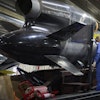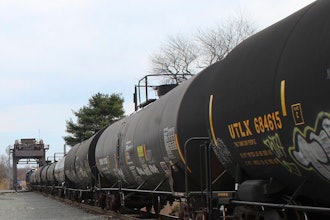DETROIT (AP) — Ford Motor Co. will pay its U.S. factory workers a $6,000 signing bonus and add thousands of U.S. factory jobs as part of a four-year contract deal reached Tuesday with the United Auto Workers union.
Most Ford workers will get profit-sharing checks instead of annual raises under the deal, starting with a payment of around $3,700 this year. Workers will also get around $7,000 in inflation protection and lump-sum payments over the life of the contract, the UAW said.
Ford plans to add 5,750 U.S. factory jobs under the deal, on top of 6,250 it announced earlier this year, for a total of 12,000 jobs by 2015. It also pledged to invest $4.8 billion in its U.S. factories.
Ford union leaders approved the deal around noon Tuesday after a meeting in Detroit. The deal is subject to a vote by Ford's workers. Voting is expected next week.
If they agree to the contract, Ford's 41,000 hourly workers will get $1,000 more as a signing bonus than the $5,000 bonus GM workers got under an agreement ratified last month. The GM agreement also gives most workers profit-sharing payments instead of annual raises and promises 6,400 new or retained jobs.
John Fleming, Ford vice president of manufacturing, said most of the 5,750 additional hires will be paid a lower wage than Ford's older workers. The agreement is expected to lower Ford's labor costs, which are the highest in the U.S. auto industry. Ford currently pays most of its workers $58 per hour in wages and benefits.
"The tentative agreement will enable us to improve our overall competitiveness here in the United States," Fleming told reporters at Ford's headquarters in Dearborn.
The contract raises Ford's entry-level wage from $15.51 per hour to $19.28 per hour over the life of the contract. Ford currently has less than 100 entry-level workers, but will hire thousands more by 2015. Ford agreed to a lower wage for entry level workers in 2007 when the company was losing billions of dollars a year.
The deal will bring some production of the Ford Fusion sedan from Mexico to a factory in Michigan. It also will bring work to the U.S. from China and Japan, Ford said. A plant in Kansas City, Mo., will produce the Transit Connect commercial van, which is now made in Europe. Another plant in Louisville, Ky., will get a new, unnamed vehicle in addition to the 2012 Escape it was promised earlier this year.
Fleming said the $4.8 billion in investments is in addition to $1.4 billion previously announced, for a total of $6.2 billion in investments over the life of the contract.
Approval of the contract could be a problem. There is some anger among Ford members about CEO Alan Mulally's $26.5 million pay package last year, and many Ford workers feel that the company is healthy enough to offer annual raises. Ford earned $6.6 billion last year.
UAW leaders said the contract keeps Ford's costs and prices competitive but allows workers to share in Ford's profits.
"UAW members sacrificed when the company was struggling and now will share in Ford's prosperity," UAW Vice President Jimmy Settles said in a statement.
Up next is Chrysler Group LLC, where the talks could be more contentious. The company isn't making as much money as Ford and GM and probably can't afford the same deals. Chrysler and the UAW have set an Oct. 19 deadline to reach a new contract agreement.
The UAW talks are watched closely because they set wages for more than 112,000 workers in the auto industry and set the bar for pay at auto parts makers and foreign-owned automakers.
Ford shares rose 4 percent, or 37 cents, to $9.74 in early afternoon trading Tuesday. GM shares gained 52 cents, or 2.6 percent, to $20.25.


















